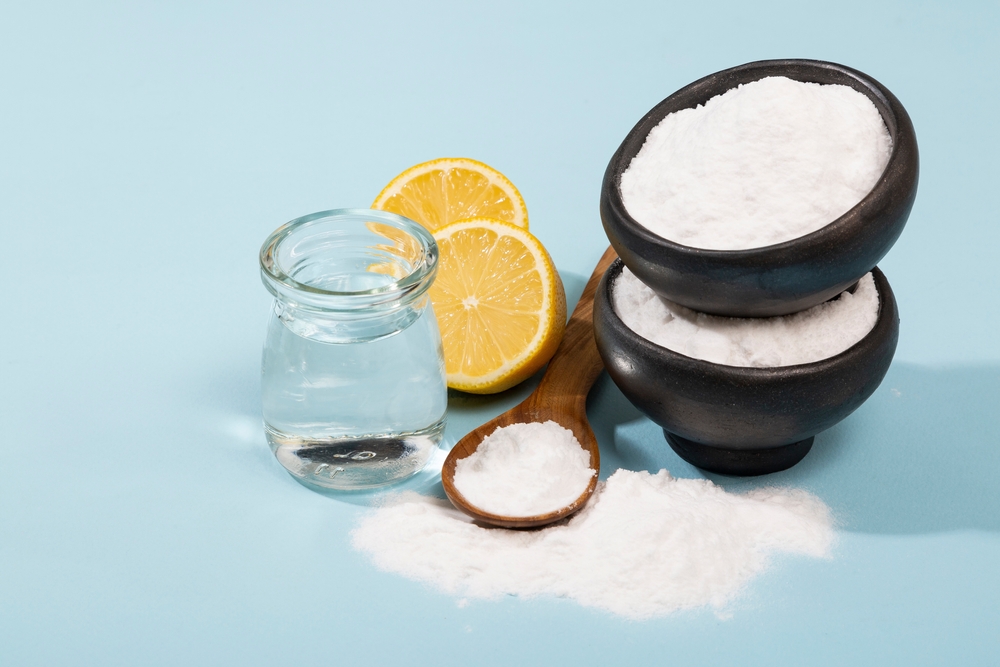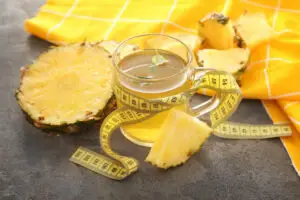Baking soda and salt in water is a versatile and intriguing combination used for various purposes, from household cleaning to potential health benefits. This mixture combines two common household ingredients, sodium bicarbonate (baking soda) and sodium chloride (salt), to produce chemical reactions and effects in water.
Upon mixing baking soda and salt in water, one of the most noticeable reactions is the fizzing and bubbling, which occurs due to the release of carbon dioxide gas. Additionally, this simple concoction has been utilised for its potential antibacterial and antimicrobial properties to help balance pH levels in the body, which could assist with a variety of health issues.
However, caution must be exercised when consuming this mixture, as excessive use or improper quantities can have adverse effects on one’s health. Drinking baking soda presents potential dangers and risks, such as poisoning, rupture, or interactions with medications.
Understanding Baking Soda and Salt
Baking soda and salt are common ingredients found in many households. These compounds have various uses, both in the kitchen and for household cleaning. Understanding the properties and differences between these two substances can help you use them more effectively.
Baking soda, also known as sodium bicarbonate, is an alkaline substance that has a variety of uses. It is a chemical compound with the formula NaHCO3, consisting of a sodium cation (Na+) and a bicarbonate anion (HCO3-). Its primary use in cooking is as a leavening agent, which helps dough and batter rise. Baking soda reacts with acidic ingredients in recipes, producing carbon dioxide gas, water, and salt. This gas causes dough or batter to expand and rise when heated, creating the desired fluffy texture in baked goods.
Salt, on the other hand, is composed of sodium chloride (NaCl). It is a naturally occurring mineral and plays a crucial role in maintaining the body’s fluid balance. In the kitchen, salt serves as a flavour enhancer and a preservative. It can also be used to improve the texture of certain foods, such as helping to tenderise meat or draw out moisture from vegetables.
Mixing baking soda and salt in water can result in various interesting chemical reactions and practical uses. For example, many people use a solution of baking soda and salt to clean and deodorise surfaces, whiten teeth, and even alleviate digestive distress. The combined properties of these two compounds work together to produce efficient and eco-friendly cleaning solutions.
In summary, both baking soda and salt serve distinct purposes in the home. Their chemical compositions provide unique benefits, making them versatile and valuable staples in any pantry. By knowing the properties and uses of baking soda and salt, you can harness their full potential and enhance your cooking, cleaning, and self-care routines.
Chemical Composition and Processes
Interaction with Water
When baking soda (sodium bicarbonate) and salt (sodium chloride) are mixed in water, interesting chemical reactions and effects occur. One noticeable observation is the fizzing and bubbling that takes place. This happens due to the baking soda reacting with water to produce carbon dioxide gas.
Baking soda’s chemical formula is NaHCO3, and it is a salt composed of a sodium cation (Na+) and a bicarbonate anion (HCO3-). On the other hand, sodium chloride is found in common table salt, with a formula of NaCl.
Chemical Reaction and pH Balance
The interaction of baking soda and salt in water affects the pH of the solution. Baking soda is slightly alkaline, which means it has a pH value above 7. When dissolved in water, it forms a mild alkaline solution, making it useful in treating gastric hyperacidity and acidosis.
The chemical reaction involves sodium bicarbonate dissociating into sodium (Na+) and bicarbonate ions (HCO3-), while salt dissolves into sodium (Na+) and chloride ions (Cl-) in water. Bicarbonate ions can react with water, forming carbonic acid (H2CO3) and hydroxide ions (OH-). Carbonic acid then decomposes into carbon dioxide (CO2) and water.
In summary, mixing baking soda and salt in water leads to a series of chemical reactions resulting in the production of carbon dioxide gas and a mild alkali solution. The pH balance of the solution is influenced by the presence of bicarbonate ions, making it useful for various applications, such as treating gastric issues and neutralising acidic substances.
Health Benefits and Uses
Digestive Health Benefits
Baking soda, or sodium bicarbonate, is known for its ability to aid in digestion and alleviate issues such as heartburn and indigestion. When mixed with water, it creates an alkaline solution that can help neutralise stomach acid and relieve discomfort caused by digestive problems. In fact, consuming a mixture of baking soda and water can act as a natural antacid, providing relief from symptoms such as gas and bloating.
Other Therapeutic Uses
Besides digestive benefits, baking soda has a range of other therapeutic uses. The alkalinity of baking soda mixed with water can support the body’s natural ability to regulate pH levels, which in turn helps to alleviate inflammation and reduce the risk of certain diseases. Furthermore, the combination of baking soda and salt in water can help to disinfect and kill bacteria in a variety of applications, from household cleaning to personal hygiene.
It is important to note, however, that claims related to cancer prevention and treatment, as well as kidney disease improvement, require more scientific evidence to support their validity and should therefore be approached with caution.
Dental Health Benefits
Incorporating baking soda and water into oral hygiene routines can offer several benefits for dental health. For instance, consuming this mixture can help balance the pH in your mouth and prevent tooth decay by neutralising harmful acids that can break down tooth enamel. This, in turn, can reduce plaque accumulation and support overall oral health.
In conclusion, the combination of baking soda and salt in water offers a variety of health benefits and uses, particularly in the realms of digestive and dental health. However, it is vital to ensure that consumption is done in moderation, as excessive intake of sodium can lead to other health issues.
How to Use Baking Soda and Salt in Water
For Digestive Health
Baking soda and salt can be used as a digestive aid. To do this, take a teaspoon of baking soda and mix it into a glass of warm water, stirring until it dissolves completely. Then, add a pinch of salt and stir again. Drinking this mixture can help to neutralise stomach acid and alleviate discomfort caused by indigestion. Remember not to consume this mixture in excess, as it may have potential health risks when drinking baking soda.
As a Natural Mouthwash
A mixture of baking soda, salt, and water can also be used as a natural mouthwash. To prepare it, dissolve 1/2 teaspoon of baking soda and an equal amount of salt into a glass of cold water. Optionally, you can add a drop of lemon juice to give it a more pleasant taste. After mixing the ingredients thoroughly, use this solution to gargle for about 30 seconds before spitting it out.
This home remedy may help to eliminate bad breath, neutralise oral pH levels, and prevent dental plaque. It is, however, not a substitute for regular dental care, and it’s essential to brush and floss daily for optimal oral health.
For Skin Cleanse
Baking soda and salt can be combined with water to create a skin cleansing solution. To make this solution, follow these steps:
- Mix 1 teaspoon of baking soda with 1/2 teaspoon of salt.
- Add just enough water to form a thick paste.
- Gently massage the paste into your skin, focusing on areas prone to excess oil and impurities.
- Rinse thoroughly with warm water and pat your skin dry.
This cleansing method can help to exfoliate dead skin cells, unclog pores, and remove dirt and excess oil. However, if you have sensitive skin, it is recommended to test the mixture on a small patch of skin before applying it to your face or other body parts, as it may cause irritation. Finally, do not use this treatment too frequently, as over-exfoliation can lead to irritation and dryness.
In conclusion, baking soda and salt mixed with water can provide numerous benefits for digestive health, oral hygiene, and skin care. However, it’s crucial to use these home remedies in moderation and consult a healthcare professional if you have any concerns or underlying health conditions.
Considerations and Precautions
Consultation with Doctor
Before using baking soda and salt in water for any health-related reasons, it’s crucial to consult a doctor. They can help determine if this solution is appropriate and safe for your specific needs, taking into account your medical history, current medications, and any potential interactions. Always follow the recommendations of healthcare professionals to avoid potential complications.
Possible Adverse Effects
Baking soda, also known as sodium bicarbonate, has various uses in the kitchen, and it is also an antacid which helps make the stomach environment less acidic. When combined with salt in water, they can create a fizzy reaction. While the mixture may have potential benefits, there are also possible adverse effects to be aware of.
Excess Sodium: Both baking soda and salt contain sodium, which, in high amounts, can affect the heart. Overdosing on baking soda has been linked to heart arrhythmias and other heart-related issues. Therefore, moderation and caution are essential, particularly for individuals with existing heart conditions or on a sodium-restricted diet.
Gastrointestinal Effects: Consuming baking soda and salt in water may cause gastrointestinal issues like nausea, vomiting, or diarrhoea in some individuals. It’s important to pay attention to how your body reacts and stop usage if any of these symptoms arise.
Alkalosis: Excessive use of baking soda can lead to a condition called alkalosis, a high blood pH level. Symptoms of alkalosis include headaches, muscle weakness, and irritability. If you experience any of these symptoms after consuming baking soda and salt in water, seek medical advice immediately.
Drug Interactions: Baking soda and salt may interact with certain medications, leading to decreased effectiveness or potential side effects. Consult your doctor before using baking soda and salt in water if you are taking any prescription or over-the-counter medications.
In conclusion, while baking soda and salt in water may provide potential benefits, it is essential to approach their usage with caution. Always consult a doctor before using this mixture for health-related purposes and be mindful of possible adverse effects.
Scientific Studies and Evidence
When discussing the effects of baking soda and salt in water, it is crucial to examine the available scientific evidence. One aspect to consider is the chemical reaction that occurs when these two substances are combined. Baking soda and salt both dissolve in water, releasing carbon dioxide gas, which forms bubbles. This reaction is the reason why the mixture is often utilised in making homemade soap or cleaning solutions.
Although the concept of drinking water with an alkaline substance like baking soda has been purported to benefit health, the acid-alkaline theory remains inconclusive. This theory suggests that consuming certain foods can slightly lower blood pH. However, current scientific evidence does not strongly support this claim.
As for the use of baking soda in cancer treatment, a meta-analysis has concluded that there is insufficient clinical evidence to recommend routine anticancer therapy being replaced with drinking water containing baking soda. In a randomised study completed in April 2016, the practicability and tolerance of 0.5 g/kg/day sodium were assessed. Still, the results were not compelling enough to make a concrete conclusion.
It is essential always to rely on trustworthy sources and remain cautious about making exaggerated or false claims. In summary, while there are some interesting findings related to the reaction of baking soda and salt in water, more extensive scientific research and randomised studies are necessary to confirm these initial observations and understand the potential benefits or drawbacks of the mixture fully.
My name is Ellis Francis and I have been a personal fitness trainer, sports nutritionalist and health and fitness advisor for over 25 years. I am the lead health and fitness advisor at https://awellnessbody.com.







